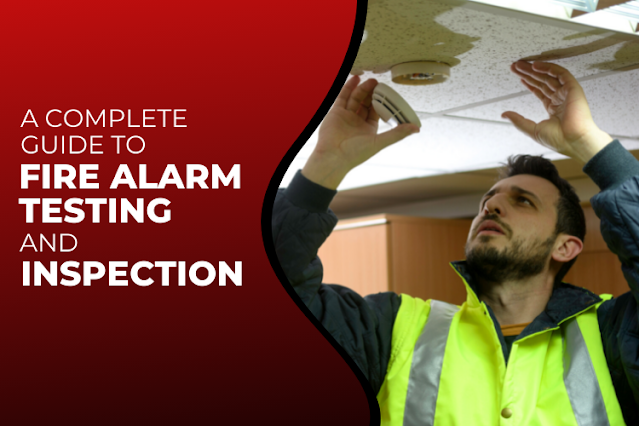A Complete Guide to Fire Alarm Testing and Inspection
No matter what industry you are a part of, having a fire alarm system is always necessary. Just installing them, however, is not enough. It is also imperative that you test and inspects your alarms regularly (and after any upgrades to your fire alarm systems) to ensure they function appropriately in case of an emergency.
The National Fire Protection Association Standards – NFPA 72, Chapter 14 apply regardless of the type of business you own or manage; you need to have your fire alarm systems tested, inspected, and maintained by a fire protection company according to these standards.
Even though the inspection intervals may vary depending on your fire alarm equipment and the rules imposed by your local Authorities Having Jurisdiction (AHJ), the NFPA Standards for quarterly, semi-annual, and annual fire alarm inspections remain the same.
Now, let’s check out what those fire alarm inspection and testing requirements look like. How often does a fire alarm need to be checked? The NFPA recommends that your fire alarm systems undergo regular testing and inspection: weekly, monthly, quarterly, semi-annually, annually, every five years, and every ten years.
Although some of these inspections and tests can be completed in-house by staff trained in fire safety, others need to be performed by a fire protection technician.
Here’s a breakdown of who can do what:
- A trained, in-house staff is present on a weekly, monthly, and quarterly basis
- A licensed fire protection technician should renew every six months, every year, every five years, every ten years
However, how often each fire alarm system and its components demand visual inspection and functionality testing depends on the variety of systems in your warehouses, restaurants, distribution centers, grocery stores, retail stores, big box stores, and other multi-site facilities.
Commercial alarm systems undertake a wide range of life safety solutions designed to detect and alert occupants to many life-threatening and property-damaging hazards in addition to fire – carbon monoxide poisoning, severe weather, leaky pipes, and active shooters, for example.
Thorough visual inspections and physical testing of your fire alarm system must occur weekly, monthly, quarterly, semi-annually, annually, and every five and 10 years, according to the NFPA Standards and your AHJ rules. Semi-annual, annual, five-year, and 10-year fire alarm inspections are to be performed by licensed and equipped fire protection technicians.
How do we create a fire alarm testing schedule?
Testing a fire alarm and its components is a detailed matter of work. Although some elements seek semi-annual testing, most of the components require annual testing, as stated in Table 14.4.3.2 of NFPA 72. The testing schedule can be modified depending on the local jurisdiction and the AHJ.
Here stated are some of the component tests:
Both audible and visual fire alarm control unit trouble signals must be verified and tested annually. Alarm notification appliances are to be tested and verified so that they operate properly, both visually and audibly.
Control equipment requires annual testing to verify apt receipt of the alarm, trouble signals, and supervisory. All interfaced equipment is to be operated/simulated to verify the signals transmitted to the control unit. Initiating devices also require testing to ensure that they are operating according to the design and transmit the signals to the control unit.
This indicates that the heat detectors require a heat test, and the smoke detectors are also supposed to be tested with a verified and approved smoke simulator.
The backup battery or secondary power supply must also be tested by disconnecting all the primary power supplies. Batteries should be tested to verify that the voltage level doesn’t fall below 2.05 volts per cell under load.
How do I host a fire alarm inspection on my property?
Well, Millbrook Fire Protection can inspect and suggest the right fire alarm inspection schedule for your property. It is where our roots run. We provide fire protection equipment inspection and installation services to our customers in the commercial and residential marketplaces. So, do not wait any further!
Our team will visit your premises and assist you in determining the most appropriate fire protection system that could assuredly meet your safety requirements.
Source: A Complete Guide to Fire Alarm Testing and Inspection




Comments
Post a Comment